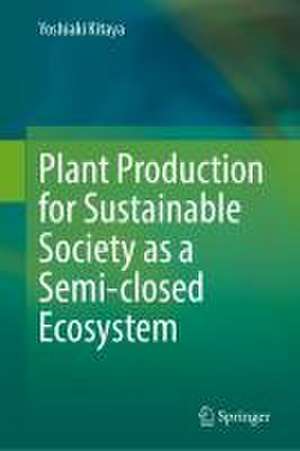Plant Production for Sustainable Society as a Semi-closed Ecosystem
Autor Yoshiaki Kitayaen Limba Engleză Hardback – 30 iun 2024
This book introduces the concept of a semi-closed ecosystem, which is necessary for the social implementation of plant production, such as agriculture, in harmony with the environment. While aiming at achieving a sustainable balance of human activities and environmental protection, this book focuses on the material cycle within each semi-closed system listed below.
1) Mangrove forests as semi-closed systems in coastal ecosystems 2) Environmental control in facility-based plant production systems as semi-closed systems
3) Control of the gaseous environment in the root zone as a semi-closed system
4) Controlled ecological life support system as a completely closed ecosystem in space
5) A sustainable balance of human activities and environmental conservation in urban ecosystems.
Developing efficient food production with less environmental loads is an important issue. Plant production is vital to human health and welfare, especially in urban areas as semi-closed ecosystems. Producing food efficiently under consideration of environmental protection is necessary with material-cycling systems, especially in semi-closed ecosystems. Establishing a resource recycling production system with reduced waste emissions has also become important in agriculture. Plant production will play an important role not only in food production (Goal 2 in SDGs) but also in many other goals. This book explains how we must regard plant production as semi-closed ecosystems, reduce material and energy resource inputs, and recycle waste emissions generated during production and consumption processes to solve the various issues. Students and researchers studying Agricultural Environmental Engineering, Environmental and Ecological Engineering, Systems Design for Sustainable Society, Environmental Control in Agriculture, etc., will find this publication a helpful reference.
Preț: 785.09 lei
Preț vechi: 1033.00 lei
-24% Nou
Puncte Express: 1178
Preț estimativ în valută:
150.23€ • 163.69$ • 126.59£
150.23€ • 163.69$ • 126.59£
Carte tipărită la comandă
Livrare economică 19-25 aprilie
Preluare comenzi: 021 569.72.76
Specificații
ISBN-13: 9789819702473
ISBN-10: 981970247X
Ilustrații: VII, 173 p. 159 illus., 108 illus. in color.
Dimensiuni: 155 x 235 mm
Greutate: 0.43 kg
Ediția:2024
Editura: Springer Nature Singapore
Colecția Springer
Locul publicării:Singapore, Singapore
ISBN-10: 981970247X
Ilustrații: VII, 173 p. 159 illus., 108 illus. in color.
Dimensiuni: 155 x 235 mm
Greutate: 0.43 kg
Ediția:2024
Editura: Springer Nature Singapore
Colecția Springer
Locul publicării:Singapore, Singapore
Cuprins
Chapter 1. General introduction.- Chapter 2. Mangrove forests as semi-closed systems in coastal ecosystems.- Chapter 3. Environmental control in facility-based plant production systems as semi-closed systems.- Chapter 4. The gaseous environment in the root zone as a semi-closed system.- Chapter 5. Controlled ecological life support system as a completely closed ecosystem in space.- Chapter 6. Sustainable balance of human activities and environmental conservation in urban ecosystems.- Chapter 7. Concluding remarks.
Notă biografică
Yoshiaki Kitaya
Textul de pe ultima copertă
This book introduces the concept of a semi-closed ecosystem, which is necessary for the social implementation of plant production, such as agriculture, in harmony with the environment. While aiming at achieving a sustainable balance of human activities and environmental protection, this book focuses on the material cycle within each semi-closed system listed below.
1) Mangrove forests as semi-closed systems in coastal ecosystems
2) Environmental control in facility-based plant production systems as semi-closed systems
3) Control of the gaseous environment in the root zone as a semi-closed system
4) Controlled ecological life support system as a completely closed ecosystem in space
5) A sustainable balance of human activities and environmental conservation in urban ecosystems.
Developing efficient food production with less environmental loads is an important issue. Plant production is vital to human health and welfare, especially in urban areas as semi-closed ecosystems. Producing food efficiently under consideration of environmental protection is necessary with material-cycling systems, especially in semi-closed ecosystems. Establishing a resource recycling production system with reduced waste emissions has also become important in agriculture. Plant production will play an important role not only in food production (Goal 2 in SDGs) but also in many other goals. This book explains how we must regard plant production as semi-closed ecosystems, reduce material and energy resource inputs, and recycle waste emissions generated during production and consumption processes to solve the various issues. Students and researchers studying Agricultural Environmental Engineering, Environmental and Ecological Engineering, Systems Design for Sustainable Society, Environmental Control in Agriculture, etc., will find this publication a helpful reference.
2) Environmental control in facility-based plant production systems as semi-closed systems
3) Control of the gaseous environment in the root zone as a semi-closed system
4) Controlled ecological life support system as a completely closed ecosystem in space
5) A sustainable balance of human activities and environmental conservation in urban ecosystems.
Developing efficient food production with less environmental loads is an important issue. Plant production is vital to human health and welfare, especially in urban areas as semi-closed ecosystems. Producing food efficiently under consideration of environmental protection is necessary with material-cycling systems, especially in semi-closed ecosystems. Establishing a resource recycling production system with reduced waste emissions has also become important in agriculture. Plant production will play an important role not only in food production (Goal 2 in SDGs) but also in many other goals. This book explains how we must regard plant production as semi-closed ecosystems, reduce material and energy resource inputs, and recycle waste emissions generated during production and consumption processes to solve the various issues. Students and researchers studying Agricultural Environmental Engineering, Environmental and Ecological Engineering, Systems Design for Sustainable Society, Environmental Control in Agriculture, etc., will find this publication a helpful reference.
Caracteristici
Presents how to think of a system as a semi-closed ecosystem to achieve a material-cycling-oriented society Covers natural ecosystems, agroecosystems, and life-support ecosystems that are closely related to human society Introduces environmental controls in facility-based systems such as facility-type horticulture and plant factories
